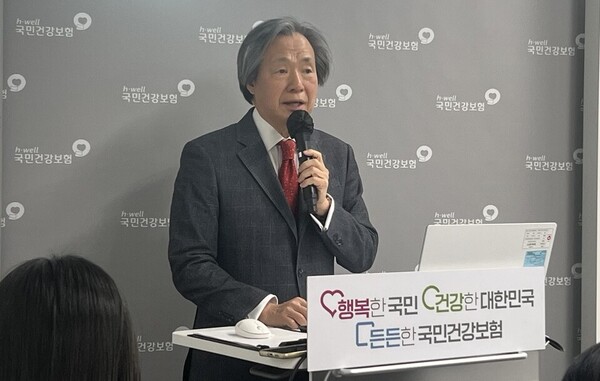The National Health Insurance Service (NHIS)’s finances could turn into a deficit if it spends 2 trillion won ($1.39 billion) this year out of the 10 trillion won in health insurance finances, as the government promised to compensate for essential medical treatment fairly.
NHIS President Jung Ki-suck said this during a news conference Thursday, where he outlined the state health insurance agency's major policy initiatives for the year.
Announcing its “Second Comprehensive Health Insurance Plan” in February last year, the government promised to invest 10 trillion won in healthcare financing by 2028 for the fair compensation of essential medical treatment.

“If the NHIS spends 2 trillion won this year from the 10 trillion won allocated for fair compensation for essential medical treatment, it will inevitably fall into a financial deficit,” Jung said. “However, since the policy depends on the timing of its implementation, we will make a financial operation plan accordingly.”
Commenting on the NHIS’s finances, Jung said, “The ongoing government-doctor conflict must not be allowed to continue. If (the emergency healthcare system) is normalized, our expenditure will increase, but there is a possibility the situation of last year will be repeated. In previous years, interns would have to report to work a week later, which seems unlikely now.”
If the conflict continues this year, the reimbursement expenditure will sharply decrease. Moreover, he added that we have about 30 trillion won in reserves, so we don't need more budget (such as government subsidies).
Regarding how to resolve the government-doctor conflict, the NHIS head said, "We've been trying to resolve the conflicts, but it's not easy. I think it would be possible to solve it if a control tower encompasses the whole."
Explaining the NHIS’s major policies this year, Jung emphasized the importance of “evidence-based” management of unreimbursed treatments.
""I find it difficult to justify unreimbursed treatments that are unrelated to patient care and negatively impact the health insurance coverage rate,” Jung said. “We need to adjust for unnecessary unreimbursed treatments."
Jung noted that the NHIS is developing a portal for unreimbursed treatments.
“Take robotic surgery for example, a major revenue sources for hospitals. The national average is 9.8 million won, and the price ranges from 4 million won to 20 million won, depending on hospitals,” he said. “I think it is one of our missions to create a system that can guide the quality of medical care, including price information.”
Jung noted that the names of individual hospitals will be disclosed on the unreimbursed treatment portal, adding that the NHIS has real-time information on unreimbursed treatment and can provide “more realistic” data.
"The most important thing about unreimbursed treatments is whether it can be ‘verified.’ It's okay if there is evidence in all fields, such as medicine, dentistry, and oriental medicine, but it shouldn't be okay if the evidence is weak,” he said. “We will discuss closely with the National Evidence-based Healthcare Coordinating Agency (NECA) about creating evidence for unreimbursed treatment."
He also explained the progress of the Ilsan Children's Hospital, which is being built next to the NHIS Ilsan Hospital in Goyang, Gyeonggi Province.
"We are about to break ground. When built, the hospital will be used as a children's hospital in ordinary times and as a hospital specializing in infectious diseases during emergencies (such as infectious disease crises),” Jung said. “"The budget has not been fully secured, but construction will proceed, and the hospital is expected to be completed in three to four years."
Commenting on concerns that the deficit of the children's hospital could be added to the deficit of the NHIS Ilsan Hospital, Jung said, “The government's policies on pediatric healthcare are being strengthened, and we are expecting more medical fee subsidies. The deficit is already being incurred, so the impact of the children's hospital will not be significant. However, we will promote management efficiency by reducing some departments.”
As NHIS’s core policy objectives for this year, Jung also cited stable financial management, expansion of coverage centered on essential medical care, healthcare for the entire lifecycle, care for healthy old age, and innovation centered on the people.
Among them, Jung said he would focus on strengthening income and expenditure management to maintain financial stability, proper medical treatment, advanced salary analysis, continuity in introducing special inspectors to eradicate illegally opened institutions and expanding field checks to strengthen the recovery of ill-gotten gains.
Related articles
- State health insurer seeks to overturn tobacco ruling with more evidence
- NHIS head calls for curbing overuse of medical services, excessive tests
- Health insurance marks surplus for 3 consecutive years with ₩28 trillion in reserves
- Hospitals to get higher anesthesia fees for 487 high-risk pediatric surgeries starting in April

